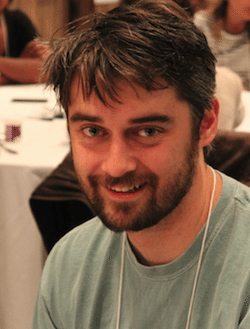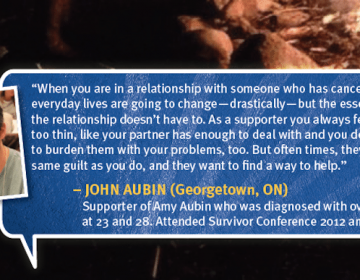By John Aubin
 So, YACC has asked me to write about the fear of recurrence, and how that fear affects me as a supporter of my wife who has Stage 4 ovarian cancer. Our lives are complicated by the fact that we know the cancer is coming back, but obviously we can’t know when or where. We spend our lives treating tumours as they arrive, and when one tumour shrinks, we wait for the next one. Our lives are lived in a perpetual state of anticipation. We wait for the next tumour, the next treatment, the results, and finally we wait for the no evidence of disease (NED) diagnosis. The problem is, once we get that NED diagnosis, we have to wait more; we have to wait for the cancer to return and for the process to repeat.
So, YACC has asked me to write about the fear of recurrence, and how that fear affects me as a supporter of my wife who has Stage 4 ovarian cancer. Our lives are complicated by the fact that we know the cancer is coming back, but obviously we can’t know when or where. We spend our lives treating tumours as they arrive, and when one tumour shrinks, we wait for the next one. Our lives are lived in a perpetual state of anticipation. We wait for the next tumour, the next treatment, the results, and finally we wait for the no evidence of disease (NED) diagnosis. The problem is, once we get that NED diagnosis, we have to wait more; we have to wait for the cancer to return and for the process to repeat.
While there is nothing fun about having a loved one in cancer treatment, in a lot of ways it is a lot easier to deal with than waiting for the cancer to return (at least that’s what I think while we wait for the cancer to return; when the cancer returns and my wife is in treatment, life is much worse). When a loved one is diagnosed with cancer, a plan is made, support comes from all angles, and there is something to occupy yourself with. Goals are set; a treatment schedule is made; child care is planned; logistics are put in place for scans, treatment, and for appointments. Every time something on the schedule is accomplished, you get to feel like you have taken a small step in helping your spouse beat cancer. I know I cannot control cancer, but having stuff to do gives me something I can control. Control breeds confidence, and there is very little more valuable to a supporter than confidence.
In between diagnoses, however, there is very little of the sort. We live in a world where we worry about making plans six to twelve months in the future because we don’t know what the situation is going to be. We live in a world where five to ten years in the future is probably a little too optimistic. There is basically nothing you can do to control the cancer returning, and as a result, there is no way to be confident in your ability to handle the situation.
It may be different if we were told that it might not come back. I guess it may feel like an obstacle we overcame, one that we can celebrate as it gets smaller in the rear view mirror. I imagine the fear would still exist in such a case, but it would be more in the background. I certainly do not mean to diminish the anxiety that anyone feels in that situation. The anxiety is real and it is hard no matter what, but for us it is not “if” the cancer comes back, it’s “when.”
When my wife is out of treatment, her body starts the long process to heal from whatever grotesque medicine the doctors used to poison her. She — slowly — starts to feel better. We settle back into a normal life (well, as normal as we can). This, I find, is when a lot of my emotions come to the surface. This is when I find myself crying for no reason, or being irrationally angry over small things. I don’t really have time to deal with my emotions while she is in treatment. I have a wife and a child who need help. It’s after treatment that I have a moment to take a breath and assess how it’s affecting me. I try not to show it to people, but there are weeks when I am probably not a lot of fun to be around.
After that, as I settle down and my wife starts to feel (a little) better, life really does start to feel normal. But the fear is always there. We are scared of our shadows. Every headache or sore joint is a cause for concern as it may be a sign that the cancer has spread. Scans happen every few months. When you have an upcoming scan, it is all you think about. Then after the scan, you have to wait for results. There is nothing like waiting to find out the cancer is back in your loved one. Sometimes you have an idea what the results will be before you get the official word, but you can never really brace yourself. You might get better at handling the bad news, but you never really get good at it.
The stress is incredible, and it warps the way you think about everything. I find that I have a harder time socializing with friends now. I feel like I don’t fit in as well as I used to. I feel like I am not being honest with them unless I talk about how my situation makes me feel. But then, once I open up, I feel like a downer, the guy who ruins everyone’s good time. Besides, trying to explain how you feel in this situation is really hard to do with someone who has never experienced it before. I usually just end up with more confusion and sad faces when I try and tell people how I really feel.
Also, and I’m probably a jerk for even writing this, but it is really hard to identify with your friends when their problems (while legitimate) do not seem like a big deal to you. For example, I have a friend who is about to have a baby. Times are tough and they are not sure how they will support the addition to the family. That’s a real problem, but seeing as my wife can no longer bare children, and it kills both of us that our daughter is an only child, it is a problem I would love to have. Intellectually, I know that this is a problem for them, but the fact that I can’t empathize scares me. I get why I feel this way, but it makes me feel both isolated and selfish.
The cancer came back for my wife in spring of 2011, and she has been fighting it ever since. In the time between treatment, I find — as a supporter — you really need to make an effort to reassess yourself and how you are coping. The bright side to all of this (if you can call it a “bright side”), is that it is also a chance to grow. Its a time to develop good habits that you will need when she is back in treatment. For example, years ago, I realized I had not gotten any exercise since high school and I decided to start running. Now, no matter what is going wrong in my world, I can always go for a run, and feel a sense of accomplishment afterwards.
Now I’m looking at myself and I am seeing that I am struggling socially. It’s a hard thing to fix, but there are a few things I can do to help. First is to find people who can relate. I have joined a couple of support groups, and I’m surprised how much it helps. I feel less isolated from people when I hear someone voice a concern that I’ve been harbouring for months.
As for me relating to people who cannot relate, that is a little more tricky. Most of the people in my life are understanding, but they can’t necessarily understand. It’s sad, but sometimes the answer is that you just need to accept that things change. They don’t have to change drastically, but the change happens nonetheless. I know I have friends who will be there for me if and when I need to vent. Even if they do not necessarily understand the emotions I am trying (but failing) to express, it is still a good idea for me to try and express them. If I didn’t vent every now and again, I would probably explode.
My wife’s cancer will return. When it does, it will be treated and then we will wait for it to return again. Cancer is never easy, but when cancer becomes a certainty in your life, it leads to emotions and stress that are unimaginable. While the fear will always be there while my wife is in-between treatments, we still need to make as normal a life as we can for the sake of our daughter. The time between treatments is a time to make up for missed opportunities, and it is a time to find ways to make your life more manageable when the next round of treatment begins.
In the past, as I mentioned earlier, I started exercising, but I have also made attempts to eat better (some attempts have been more successful than others), and I’ve even learned to cook (sort of). Now my goal is to work on being able to communicate better with people, hopefully without being a buzzkill. If I can succeed, while my wife is out of treatment, then it will inevitably make asking for help while she is in treatment easier.
Read more of John’s posts on our website, or check out his blog!








